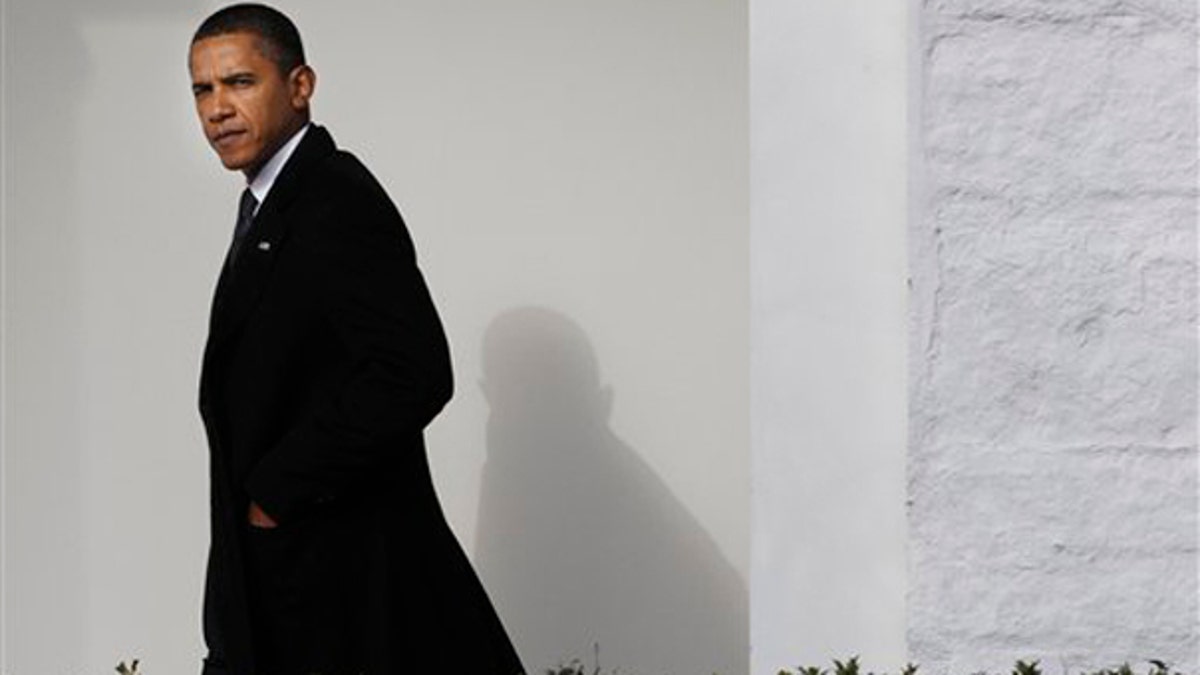
President Barack Obama walks back to the Oval Office of the White House in Washington, Tuesday, Jan. 12, 2010, after traveling to Delaware to attend the funeral services for Jean Biden, mother of Vice President Joe Biden. (AP Photo/Pablo Martinez Monsivais) (AP)
President Obama's first State of the Union address should be coming soon -- but exactly how soon is still anyone's guess.
The speech has already sparked protests for potential scheduling conflicts with TV's most popular programs. The White House has announced that the president won't deliver the address on the same night as the premiere of "Lost," relieving the legions of fans of the popular ABC series, which is scheduled to debut Feb. 2.
As of Tuesday, the White House still had not said when it will come, though a senior congressional leadership aide told Fox News that Obama is planning to speak in the week after the Super Bowl, Feb. 7.
Obama apparently is trying to give congressional Democrats more time to finish negotiations on a final health care bill, so he can tout it in his speech.
The House passed its version in November and the Senate on Christmas Eve. But negotiators are struggling to find common ground between the versions, which differ in how to pay for the entitlement program, among other sticking issues.
So if the address doesn't come in late January or early February, how late can it come?
"It can be delivered as late as the president chooses to deliver it," Brookings Institution presidential expert Stephen Hess said with a laugh, noting that there is no constitutional deadline.
In fact, the Constitution does not require the president to make a speech at all. It says only that the president shall "from time to time give the Congress information of the State of the Union, and recommend to their consideration such measures as he shall judge necessary and expedient."
President Woodrow Wilson broke a 100-year tradition of submitting written State of the Union speeches to Congress when he delivered it in person. President Harry Truman became the first to deliver the speech on television, and President Lyndon Johnson was the first to shift the speech from daytime to primetime.
That began a game of showmanship, putting pressure on presidents to give the speeches "more juice," said Hess, who was involved in writing three State of the Union addresses for President Eisenhower. Still, "the speeches themselves are usually not memorable," he said, noting the President Reagan began the practice of putting people in balconies and drawing attention to who was sitting next to the first lady. "You do the best you can to hold an audience."
But a State of the Union address that comes after early February would break presidential tradition.
"I would say that it would be unprecedented if it slipped into mid-February," said Lee Edwards, a presidential historian with the Heritage Foundation.
Edwards said it's not unusual for a new president to take a little longer to deliver his address, but he decried the current uncertainty over the speech.
"I think it's a reflection of the permanent campaign that everything now is looked at in terms of political impact," he told FoxNews.com. "Given where the country is, I would think the American people would want a message from their president sooner rather than later. And he's stretching it because he wants to have that historical accomplishment of health care reform."
Obama may have a lot to highlight in his first address. According to an annual study by Congressional Quarterly, Obama set a record last year for getting Congress to vote his way. He won 96.7 percent of the votes on which he had clearly staked a position, nearly 4 percentage points higher than the previous record set by Lyndon Johnson in 1965.
The votes included the $787 billion stimulus package, confirming Supreme Court Justice Sonia Sotomayor, bailing out the U.S. auto industry and allowing the Food and Drug Administration to regulate tobacco.
Votes that have advanced his priorities but haven't yet passed the Senate include remaking the health care system, overhauling financial regulations and reducing greenhouse gases.
Obama won 68 votes and lost four in the House; in the Senate he won 78 votes and lost one.
Hess said he expects Obama to take credit for all of the legislative accomplishments of the last year and then lay out his agenda for the next, which he says will be tricky.
"He is a president who has laid out an agenda much more specifically than previous presidents, which has gotten him into trouble because it's a broad agenda," he said. "He has a lot of pieces that have to be reconciled and it will be noted if any of them [are] not mentioned" in the speech.
Edwards said Obama is under tremendous pressure to deliver a strong speech.
"I think in that sense, he's realizing to organize a community is one thing and it's another thing to organize a nation," he said.
"I think he's going to have to rise to the occasion," he added. "People are going to be looking at him as questions are being raised about whether he is a one-termer, and does he have it in him to be the president that Democrats -- and Republicans -- are expecting him to be."
























